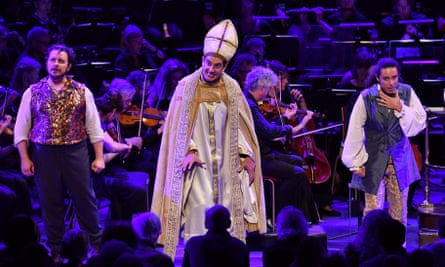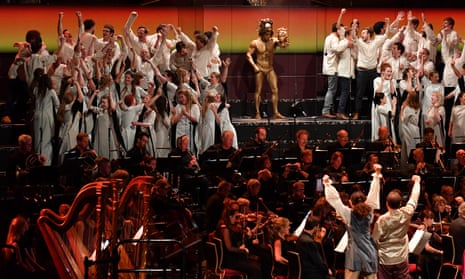‘I’m convinced there’s an absolute masterpiece in there that has to be dug out like a pearl from an oyster,” John Eliot Gardiner commented in a recent interview, on Benvenuto Cellini, Berlioz’s first opera. Unsuccessful at its 1838 Paris premiere and during its composer’s lifetime, it had to wait until the late 20th century for audiences and performers to appreciate its worth. To mark the 150th anniversary of Berlioz’s death, meanwhile, Gardiner has embarked on a European tour of the work, in a semi-staging by Noa Naamat, with the Monteverdi Choir and Orchestre Révolutionnaire et Romantique. He brought it to the Proms after performances in Berlioz’s birthplace, La Côte-Saint-André, and Berlin.
A portrait of the famous sculptor as an iconoclastic rebel, the score, riotous in its profusion, has a reputation for being difficult and problematic, both for the considerable demands it places on its performers, and for its supposed unevenness of inspiration. Its greatness, we are frequently told, is hampered by too many longueurs. Here, however, the technical challenges were all formidably met in playing and singing of tremendous precision and often hair-raising exuberance. Gardiner conducted with almost ferocious energy. Rhythms were exactingly precise, textures beautifully illuminated, shifts in mood immaculately judged. The Monteverdi Choir sounded thrilling, above all in the complex tarantella that Berlioz reused as the allegro in his Roman Carnival Overture. It was impossible not to be swept away by it all, and just for once not a note seemed out of place, with no sense of longueurs whatsoever.

There wasn’t a weak link in the cast, either. Michael Spyres made a superb Cellini, handsome and seductive in tone, ardent in his passion for Sophia Burgos’s sensual, spirited Teresa, and standing up to Tareq Nazmi’s manipulative, if none too bright Pope with assertive dignity. Maurizio Muraro was the blustering yet dangerous Balducci; Lionel Lhote, impeccable both in comic timing and vocal warmth, the outstanding Fieramosca. Naamat’s staging, meanwhile, strong in its narrative clarity and cleverly using the limited space of the Albert Hall platform, had an understated brilliance.

Comments (…)
Sign in or create your Guardian account to join the discussion